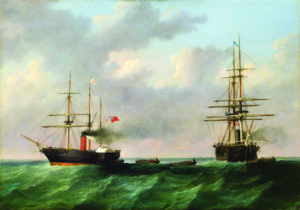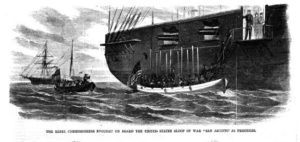Newspaperman Roger Hawthorne presented a letter to the Provincetown Board of Selectmen in November 1961, urging the board to recognize the 100th anniversary of the “Trent Affair” with a proclamation and participation in various public events. Hawthorne’s connections to Provincetown included a stint in 1926-27 as a surfman at Peaked Hill Bar Coast Guard station.
Attorney John C. Snow, a member of the board, quickly expressed concerns about the cost these festivities, but Hawthorne assured the group it would not exceed $100. The Cape Cod Chamber of Commerce had offered to underwrite publicity and the Library of Congress, the Massachusetts and federal Civil War Centennial Commissions, the British Embassy and Consulate, Cape Cod Community College, the BBC and Station WOCB, the Standard (now Cape Cod) Times, and the Associated Press had all pledged to send emissaries. Persuaded, the board, “in consideration of this historic event enacted in Provincetown,” proclaimed June 1 be designated for “appropriate ceremonies in schools and public assemblies.”

Just in case the board members were not well versed in the history of the Civil War, Hawthorne briefly recited the very unromantic events in 1861-2 that had become known as the Trent Affair. A little more than six months after the war began, U.S. Navy Capt. Charles Wilkes boarded the British mail packet RMS Trent and forcibly seized Confederate diplomats James Murray Mason and John Slidell, who were en route to England and France seeking diplomatic recognition and aid for the South. Britain vigorously protested their capture and imprisonment (reversing her earlier position on the right of search and seizure on the high seas, which had precipitated the War of 1812) and prepared for war with the North.
President Abraham Lincoln, understanding the impossibility of fighting two wars at the same time, secretly ordered the release of the prisoners being held at Ft. Warren on George’s Island in Boston Harbor and they were taken to Provincetown. Under cover of darkness they were transferred to a British gunboat to resume their voyage. The result for posterity was the end of the Trent Affair and the admission into Admiralty Law of the prohibition of search and seizure at sea.
The president’s action caused great controversy at the time, both locally and abroad. A letter concerning the proposed 100th anniversary commemoration in 1962, published in the Provincetown Advocate, decried the celebration of “a shameful incident in our history,” and described the choice of Provincetown for the secret transfer “no matter of pride.”

The truth seems more likely to be that Provincetown was the right place at the right time. The town and its deep-water harbor lies 47 nautical miles from Boston. British gunboats at the time operating at top speed could travel 7.5 knots or 8.6 mph, covering the distance in a little more than six hours.
Hawthorne met with the selectmen again in April 1962, when he suggested time was getting short to make arrangements for a June observance, and if no action was immediately taken it would amount to a “repudiation” of the proclamation and “would certainly require some sort of public explanation since numerous federal and state agencies and the press have been apprised of the proclamation.”
Neither the agencies nor the press, it seems, were clamoring for a response. I could find no record of one having been issued by the board. If there was an observance of the anniversary, those details have also disappeared. Nevertheless, numerous histories of the Civil War include lengthy discussions of the Trent Affair, and they all mention Provincetown.
